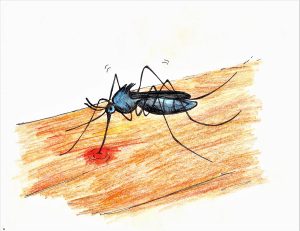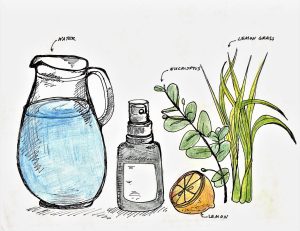
Author: Layal Bou Abdo MSN
Illustration: Angeline Boswell
Mosquitoes
Mosquito is a Spanish word that means Little Fly. Mosquitoes are small insects with six legs and long mouthparts (proboscis).
Only female mosquitoes bite. Males have feathery antennae that help them sense the presence of female mosquitos. Females have less bushy antennae. Males usually live for about a week, while females can live for a few months. There are 82 species in Canada and 2500 around the world. There are three different types of mosquitoes in the world: Aedes, Culex and Anopheles.
Where are mosquitoes found?
Wherever there is still slow-moving water, there are mosquitoes. These tiny pests lay their eggs in shallow, stagnant water. They lay between 100 and 400 eggs at one time. The eggs live in marshes, ponds, lakes, kids pools, the inside of tires, birdbaths, and other containers with shallow water.
The eggs hatch in 1 or 2 days into larvae, which look like tiny worms. The life cycle from egg to adult can take less than ten days if the temperature is right. The ideal temperature is between 22° and 27°C.
Why do mosquitoes bite?
Mosquitoes bite and suck blood for reproduction. Since blood is a good source of proteins, iron and amino acids, female mosquitoes drink it to grow their eggs. Male mosquitoes do not bite. They only eat flower nectar, water, and plant sap, which females feed on as well.
How do mosquitoes spread disease?
Mosquitoes spread disease through their bite. Mosquitoes are vectors that send infections through the blood. Vectors are living things that carry diseases between animals and humans. When the female mosquito bites into our skin, it also injects a bit of saliva into our blood to prevent it from clotting. A red bump or a welt develops when our skin has an allergic reaction to this saliva. There is an exchange of fluids between the mosquito and your bloodstream. The mosquito becomes infected when it feeds off a person or animal carrying a transmittable disease or a disease caused by bacteria or a virus. It then passes the infection on when it bites. Mosquitoes often feed in a method called sip feeding. The mosquito does not suck all the blood it needs from one source – it takes many meals from many sources. Unfortunately, this exposes more people to infection.
What types of diseases can mosquito bites spread?
| Disease | Location | Mode of transmission | Symptoms |
| Chikungunya | Found in Africa, North and South America, Asia, Europe and the Indian subcontinent | Aedes aegypti mosquito | Fever, joint and muscle pain, headache, nausea, tiredness and a rash. |
| Zika | Found in Africa, North and South America, Asia and the Pacific region | Aedes aegypti and Aedes albopictus mosquito
Once a person is infected, the virus can be transmitted from person to person through intercourse. |
The symptoms of Zika include a mild fever, headache, joint and muscle pain, a skin rash, and irritated eyes.
Zika can also impact an unborn child if the mother is infected while pregnant. |
| Dengue | Found in Africa, North and South America, Asia, and Europe | Aedes aegypti mosquito | The symptoms of dengue are similar to the flu. Other symptoms include fever, headache, joint and muscle pain, and nausea. |
| West Nile virus | Found in Africa, North America, West Asia, Europe, and the Middle East | Culex mosquito | West Nile virus can be fatal. Symptoms of the most severe version of the virus can include headache, fever, a stiff neck, confusion, coma, convulsions, and weakness of the muscles. |
| Malaria | Found in Sub-Saharan Africa | Anopheles mosquito | Symptoms of malaria can include fever, headache, and vomiting. Malaria can be fatal. |
| Yellow fever | Found in Africa and Latin America. | Aedes aegypti mosquito | Symptoms of yellow fever can include fever, headache, muscle and back pain, lack of appetite, and vomiting. Yellow fever can be fatal. |
Who is the most prone of getting a mosquito bite ?
- Wearing dark-coloured clothing
- Wearing perfume
-
Blood type: We release a chemical through our skin that reveals our blood type. According to science, the chemical produced by the O blood group attracts mosquitoes. Are you a blood O type? You may have a mosquito problem to deal with!
-
Body temperature: Our sweat contains chemicals that help mosquitoes find us faster. These chemicals are lactic acid, uric acid and ammonia.
- Pregnancy because pregnant women exhale more carbon dioxide
- Visiting a region with active mosquito-transmitted diseases
- Spending time near stagnant water
What are the symptoms of a mosquito bite?
The common symptoms include:
- Itchy and irritated skin
- A raised, a circular bump appears on the skin where the mosquito bite occurred. This welt disappears in a few hours for most people. But, for some, the allergic reaction is stronger, and the welts can stay on for days.
- Small blisters instead of hard bumps
- Dark spots that look like bruises
More severe symptoms can include:
- An allergic reaction (hives, swollen throat, faintness, and wheezing)
- A large area of swelling and redness
- Low-grade fever
- Swollen lymph nodes
- Infection of a disease carried by a mosquito (fever, headache, body aches, rashes, nausea, eye irritation, and tiredness)
How are mosquito bites treated?
-
Wash the area with soap and water.
-
Apply an ice pack for 10 minutes and as needed.
-
Create a paste using one tablespoon of baking soda mixed with water.
-
- Apply the paste to the mosquito bite.
- Wait 10 minutes.
- Wash off the paste.
- Do not scratch bites. They can become infected.
- Use an over-the-counter anti-itch or antihistamine cream.
-
See a healthcare provider if:
-
More severe symptoms appear after a bite, see your healthcare provider.
-
You experience symptoms following a recent visit to a place where mosquito-spread infections are common. Treatment will vary depending on the type and severity of the infection.
-
How do I prevent mosquito bites?

Even a short time outdoors can be long enough to get a mosquito bite. We can prevent mosquito bites in so many ways by:
- Eliminating any standing water around the house or in the backyard
- Use a swatter to kill mosquitoes in the home.
- Avoid travelling to an infected area.
- Use an approved insect repellent with a PCP registration number on the label*.
- Wearing pants and long sleeves, and socks
-
Mosquitoes may bite through thin clothing. So, spraying clothes with repellent will give extra protection.
- Utilizing screens over windows and doors
- Staying indoors during the highest point of mosquito activity (dusk and dawn)
- Treating clothing, tents, and net coverings with chemicals that repel mosquitoes
- Replacing light bulbs: Replace outdoor light bulbs with yellow bulbs that are less attractive to mosquitoes.
Follow safety guidelines, when visiting an area with an active mosquito-carried disease. It can be dangerous to travel to locations with active mosquito-carried infections when pregnant. Transmission of the Zika virus to a pregnant woman can impact the fetus and cause birth defects. The virus can also spread through sexual contact. It is crucial to protect yourself and your partner if you have travelled to a region with Zika.
How do to apply insect repellent?
- Put on sunscreen first.
- Don’t apply repellents under your clothes.
- Don’t spray directly onto your face; instead, spray your hands and rub repellent on your face.
- Avoid your eyes and mouth.
- Don’t apply to injured or irritated skin.
- Do not allow children to apply repellent themselves.
- Wash your hands after you use repellent.
Did you know?
-
Mosquitoes play a large role in the ecosystem. Mosquitoes form an indispensable source of biomass in the food chain. They serving as food for fish as larvae and for birds, bats and frogs as adult flies, and some species are important pollinators.
-
Mosquitoes have their own blood, called hemolymph! Hemolymph exist in arthropods, including insects. The substance is primarily composed of water, and also contains a mix of substances like ions, pigments, carbohydrates, lipids, glycerol, amino acids and hormones. The hemolymph is clear to yellowish.
-
These little flies are more active from dusk to dawn. They rest during the day, because the air is generally calm, making it easier to fly and search out hosts. In the wintertime, they hibernate. Old mosquitoes die as cold weather approaches. But their eggs survive the cold winter, and hatch during the warmer spring weather.
-
Mosquitoes have small brains. Their brain is simple compared to a human brain. But is enough to help mosquitoes see, move, taste, and detect scents or heat.
-
Since they eat and digest blood or nectar, mosquitoes do poop. Their waste can either be in a semi-solid or liquid form.
-
They are short-distance travellers and can travel 100-200 feet (30-60 meters) at a time, at a speed of 1-1.5 miles/hour (1.5- 2.4km/hr). They are one of the slowest flying insects around, despite their small body weight.
-
The typical mosquito season runs from May to September. Although, the breeding season is usually July through September.
-
Mosquitoes date back as far as 400 million years in the Triassic Period.
We found this great CDC resource; an activity book about mosquito bites: https://www.cdc.gov/zika/pdfs/zika-activity-book-us.pdf
*Repellent containing permethrin should not be directly applied to the skin.
We are confident your kid asks you health (human & animal) questions that genuinely leave you stumped! Leave a comment below, and we are happy to answer “why” in future blogs. Reach out to us on Twitter using the #AskTheLittleMedicalSchool
Copyright © 2021 Little Medical School Ottawa


THANKS LITTLE MEDICAL SCHOOL
Thanks for reading and enjoying our article!
[…] Mosquitoes bite and suck blood for reproduction. Since blood is a good source of proteins, iron and amino acids, female mosquitoes drink it to grow their eggs. Male mosquitoes do not bite. They only eat flower nectar, water, and plant sap, which females feed on as well. via […]
[…] Mosquitoes bite and suck blood for reproduction. Since blood is a good source of proteins, iron and amino acids, female mosquitoes drink it to grow their eggs. Male mosquitoes do not bite. They only eat flower nectar, water, and plant sap, which females feed on as well. via […]
[…] Abdo, L. B. (2021). Why do mosquitoes suck your blood? Little Medical School. https://littlemedicalschool.com/ottawa/blog/why-do-mosquitoes-suck-blood/ […]
Thanks for sharing this amazing blog.Only female mosquito bite and such human blood.They need human blood for reproduction and their survival too.
[…] is a predator whose survival depends on the blood. The entire species cannot multiply without sucking a tiny bit of the life force of others. White […]
[…] is a predator whose survival depends on the blood. The entire species cannot multiply without sucking a tiny bit of the life force of others. White […]
[…] Black people everywhere a valuable lesson:Whiteness is a bug. It is a predator whose survival depends on the blood. The entire species cannot multiply without sucking a tiny bit of the life force of others. White […]
[…] blood are female mosquitoes. While male mosquitoes depend on nectar to survive, females require the proteins, iron and amino acids derived from blood to develop their eggs. Not only people, but animals can also be sources of blood […]